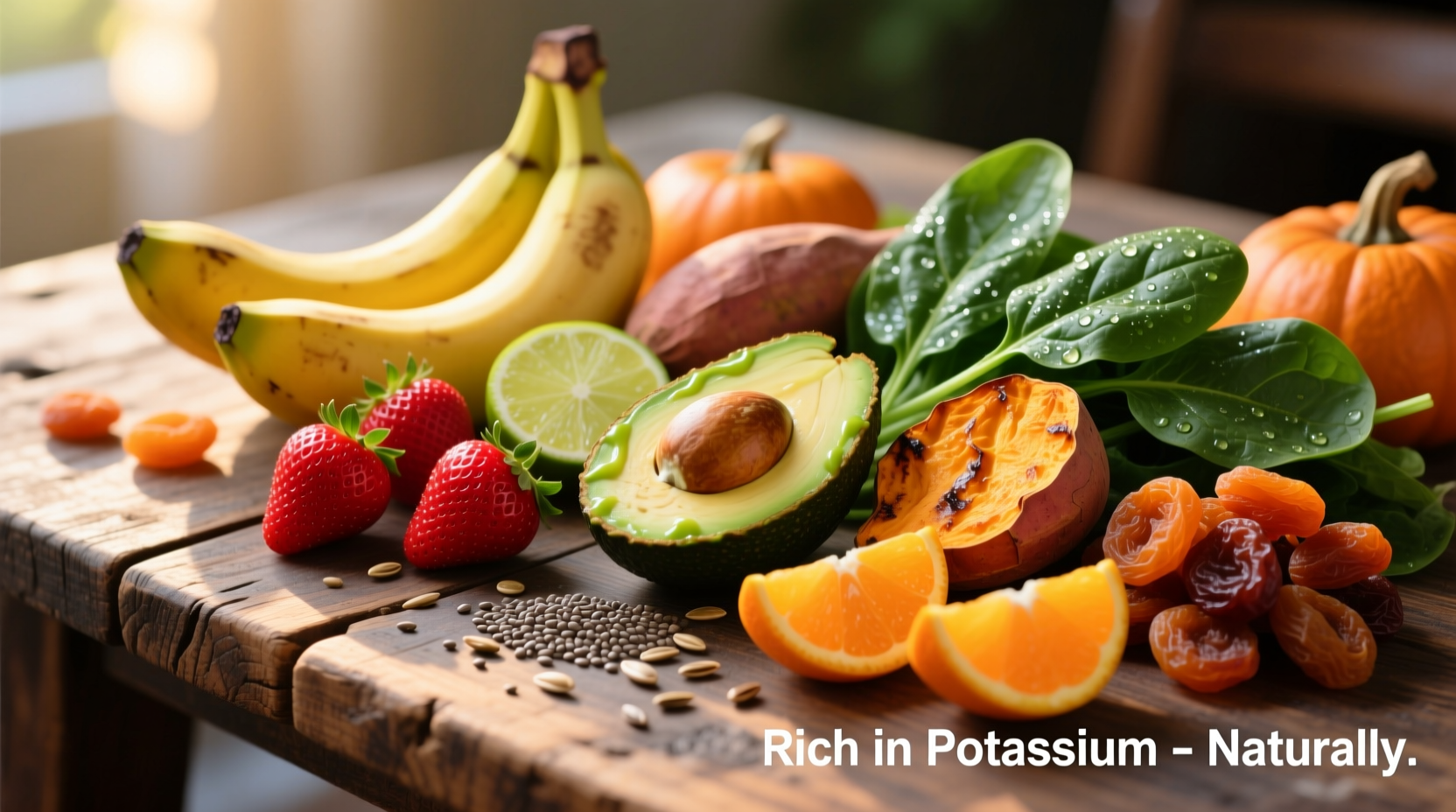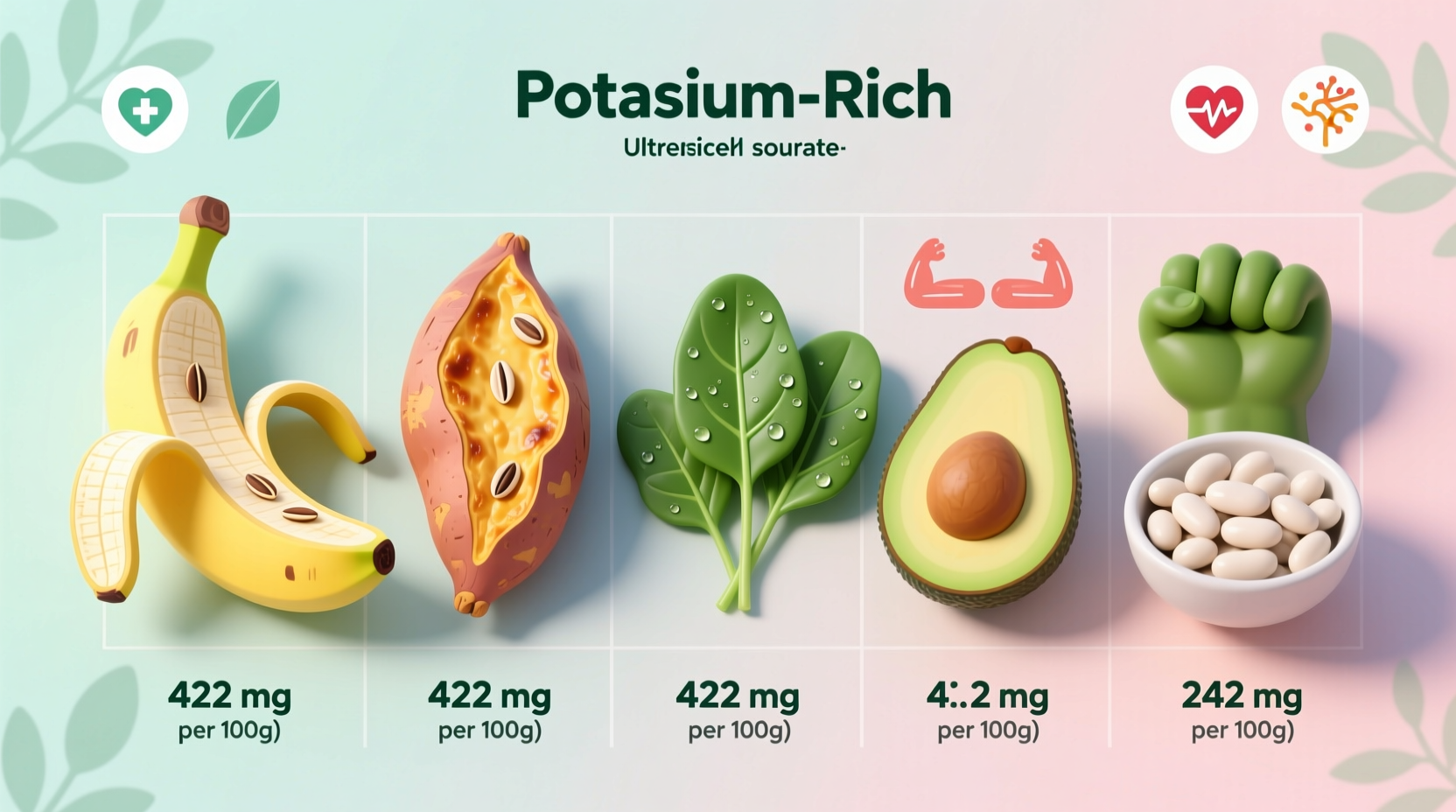Top potassium-rich foods include sweet potatoes (542mg per medium potato), white beans (502mg per ½ cup), spinach (420mg per ½ cup cooked), avocado (364mg per half), and bananas (422mg per medium fruit). These nutrient-dense options provide 10-20% of your daily potassium needs in single servings, supporting blood pressure regulation and muscle function.
When searching for what foods are a good source of potassium, you need reliable, science-backed information that delivers immediate value. Potassium isn't just about bananas—this essential mineral powers critical bodily functions from nerve signaling to fluid balance. The National Institutes of Health recommends 2,600-3,400mg daily for adults, yet most people fall short. Understanding which foods deliver substantial potassium without excess calories transforms how you approach heart health and muscle recovery.
Why Potassium Matters More Than You Think
Potassium works as your body's natural counterbalance to sodium, helping maintain healthy blood pressure levels. According to the American Heart Association, increasing potassium intake while reducing sodium can lower systolic blood pressure by 4-5 mm Hg in hypertensive individuals. This mineral also enables proper muscle contractions—including your heartbeat—and supports kidney function by helping eliminate waste products.
Despite its importance, the CDC reports only 3% of Americans meet daily potassium requirements. This deficiency often stems from overreliance on processed foods, which lose potassium during manufacturing while gaining sodium. The good news? Whole food sources deliver potassium alongside complementary nutrients that enhance absorption.
Potassium Powerhouses: Food Comparison Guide
Not all potassium sources are created equal. Some foods pack more potassium per calorie, while others offer additional health benefits. This comparison helps you make strategic choices based on your dietary needs:
| Food (Serving Size) | Potassium (mg) | % Daily Value | Additional Benefits |
|---|---|---|---|
| Sweet Potato (1 medium) | 542 | 12% | High in vitamin A, fiber |
| White Beans (½ cup) | 502 | 11% | Excellent protein source |
| Spinach (½ cup cooked) | 420 | 9% | Rich in iron, vitamin K |
| Avocado (½ fruit) | 364 | 8% | Healthy monounsaturated fats |
| Banana (1 medium) | 422 | 9% | Convenient portable option |
| Salmon (3 oz) | 326 | 7% | Omega-3 fatty acids |
Data sourced from USDA FoodData Central (2023 release). Note that cooking methods affect potassium content—boiling vegetables can leach up to 60% of potassium into water, while steaming preserves more nutrients.
Context Matters: Who Needs More Potassium and When
While potassium benefits everyone, certain situations increase requirements. Athletes lose potassium through sweat during intense training—endurance runners may need 15-20% more than sedentary individuals. People taking diuretics for hypertension often require potassium monitoring, as these medications increase excretion. The Mayo Clinic notes that individuals with kidney disease must carefully regulate potassium intake, as impaired filtration can cause dangerous buildup.
Seasonal variations also impact needs. During summer months, increased sweating raises potassium loss by 10-15% according to research published in the Journal of Sports Science & Medicine. This explains why athletes traditionally consume potassium-rich foods like bananas during warm-weather training.

Practical Integration: Making Potassium Work for You
Boosting potassium doesn't require drastic diet changes. Start your day with a spinach and banana smoothie (600mg potassium), swap afternoon chips for avocado toast on whole grain bread (500mg), and choose white bean soup instead of cream-based options for lunch (800mg). These simple swaps can add 1,900mg of potassium to your daily intake without calorie overload.
For those monitoring sodium intake, potassium-rich foods provide natural balance. The Harvard T.H. Chan School of Public Health emphasizes that whole food potassium sources work synergistically with other nutrients—unlike supplements, which lack these complementary compounds. Their research shows diets high in potassium-rich produce correlate with 20% lower cardiovascular risk compared to supplement-only approaches.
Avoiding Common Potassium Myths
Many believe bananas reign supreme as potassium sources, but ounce-for-ounce, potatoes and beans deliver more. A medium banana provides 422mg, while the same weight of white beans offers 502mg. Another misconception: cooking destroys all potassium. While boiling reduces content, roasting and steaming preserve 80-90% of this mineral.
Supplements aren't necessary for most people—the NIH states that food sources provide safer, more effective potassium delivery. Only individuals with specific medical conditions under physician supervision should consider supplements, as excessive potassium can cause cardiac issues.
Your Potassium Action Plan
Build sustainable habits by incorporating three potassium-rich foods daily. Try this sample menu:
- Breakfast: Greek yogurt with banana slices and chia seeds (500mg)
- Lunch: Lentil soup with spinach and sweet potato (900mg)
- Dinner: Baked salmon with roasted Brussels sprouts (600mg)
This simple plan delivers approximately 2,000mg of potassium—more than half your daily requirement—through delicious, whole foods. Remember that variety ensures you get complementary nutrients that enhance potassium's benefits.
Frequently Asked Questions
How much potassium do I need daily?
Adults require 2,600mg (women) to 3,400mg (men) daily according to the National Academies of Sciences, Engineering, and Medicine. Individual needs vary based on age, activity level, and health conditions.
Can I get too much potassium from food?
It's extremely difficult to overdose on potassium through diet alone. Healthy kidneys efficiently eliminate excess potassium. Those with kidney disease should consult their physician about appropriate intake levels.
Do cooking methods affect potassium content?
Yes—boiling vegetables can leach 40-60% of potassium into water. Steaming, roasting, or microwaving preserves more potassium. When boiling, consider using the cooking liquid in soups to retain nutrients.
Are potassium supplements better than food sources?
For most people, food sources are preferable. Whole foods provide potassium alongside fiber, vitamins, and phytochemicals that work synergistically. Supplements may be recommended for specific medical conditions under medical supervision.











 浙公网安备
33010002000092号
浙公网安备
33010002000092号 浙B2-20120091-4
浙B2-20120091-4